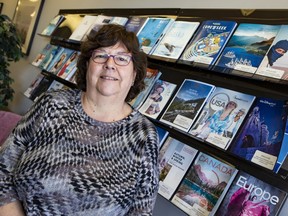One travel consultant says what’s more concerning for clients these days are inflated airfare prices, markedly higher since war began in Ukraine.

Article content
Ottawans starved for trips abroad and the pandemic-battered local tourism industry are celebrating the federal government’s decision on Thursday to end the pre-arrival COVID-19 testing requirement for fully vaccinated travellers bound for Canada.
Advertisement 2
Article content
The change will come into effect April 1 and apply at land, air and marine points of entry.
All inbound travellers will have to upload their details to the ArriveCan app, and those who are vaccinated could still be subject to random molecular tests when they arrive at Canadian airports. But they don’t have to quarantine while waiting for the results.
Unvaccinated or partially vaccinated Canadian adults who are returning to the country will still need to present proof of accepted pre-arrival test results, get tested on arrival and again eight days later, as well as complete a 14-day quarantine (with some exceptions).
The news of the federal government’s plan broke a day ahead of the official announcement. At Kanata’s Centrum Travel, senior leisure travel consultant Sandra McMurray said Thursday morning that they’d already been receiving excited calls.
Advertisement 3
Article content
Many people had still been postponing travel if their work wouldn’t allow for an extended stay in their destination country in the event they tested positive for COVID-19 before returning to Canada, McMurray said. Since January 2021, Canada has required that air travellers present negative test results before entering the country or returning from abroad.
“Now they don’t have to worry about that. So we have already had people calling in saying, ‘Yay, yay, yay. It’s going to be lifted and now we can go away on holiday, so we need you to start looking for us,’” McMurray said.
She said Thursday’s news was a very positive development for the travel industry.
“I mean travel has picked up insanely anyway because everybody just sort of said, ‘We’re tired of this, we’re going.’ But this is just going to put it over the edge now.”
Advertisement 4
Article content
The impending policy change will also cut out the cost of pre-flight testing, which can range from less than $100 to more than $200 for a PCR test, depending on location and availability. But, for many travellers, the affordability impact may seem to be marginal in the face of other cost challenges.
Fairouz Travel’s Armin Maz says what’s more concerning for his clients these days are inflated airfare prices, markedly higher since the beginning of the war in Ukraine.
Maz, a travel consultant, says many of his travellers head overseas to Europe and the Middle East, and the increased cost of flights is preventing some from booking. He was working with two families Thursday looking to travel to Cairo, Egypt. At the same time pre-pandemic, round-trip fares would have been $1,200 to $1,400, he said. Now they’re over $1,700.
Advertisement 5
Article content
“They’re all fully vaccinated. They don’t mind doing the pre-departure and pre-arrival COVID testing.” But the cost of airfare, he said, “That’s what’s more concerning to them. That’s what I see.”
The Ottawa Gatineau Hotel Association gave a figurative thumbs up to the announcement, with president Steve Ball saying “anything that makes it easier for people to travel will help our industry to recover.” The big thing, he said, is “the return of the meetings and convention business that Ottawa depends on for the tourism economy to thrive”.
Ottawa Tourism director of communications Jantine Van Kregten said that, while more than 85 per cent of visitors to the capital were Canadians, those coming from abroad “tend to stay longer and spend more.”
Advertisement 6
Article content
In the short term, the expectation is that the change will help Ottawa’s tourism economy by encouraging visiting friends and family from outside the country to come to the capital, Van Kregten said. However, “we still have work to do to ensure flights return and that tour operators and meeting planners adapt to these changes. Those aspects of tourism take longer to recover.”
Van Kregten said Ottawa Tourism would be working with partners to “help spread the word of the policy change” to the foreign markets from which tourists are drawn.
-With files from The Canadian Press
COVID travel rule changes
For vaccinated travellers
• Vaccinated travellers coming to Canada by air, land or water no longer need to provide a pre-arrival COVID-19 test
Advertisement 7
Article content
• Travellers may be randomly selected to take a COVID-19 test upon arrival but they won’t have to quarantine while awaiting the results
• Travellers must still use the ArriveCAN app to submit this information in ArriveCAN. Travellers who arrive without completing their ArriveCAN submission may have to test on arrival and quarantine for 14 days
For unvaccinated travellers
• No changes have been made to the rules for unvaccinated or partially vaccinated travellers who are permitted to travel to Canada.
• Unvaccinated and partially vaccinated travellers five and older are still required a rapid antigen test conducted by an accredited lab or testing provider no more than a day before their scheduled flight or arrival at a land or marine border in Canada.
• They can also provide a negative molecular test taken no more than 72 hours before their flight or arrival at a land or marine border or a previous positive molecular test taken at least 10 calendar days and no more than 180 calendar days before coming to Canada.
Domestic travel
• There are no changes to any rules for domestic travel by train or air. COVID tests are still not required for travel but all travellers must be fully vaccinated.
Masks
• Masks remain mandatory on all flights and inter-city train service in Canada.
